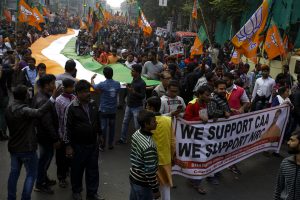In mid-January, Australian Prime Minister Scott Morrison will head to India for an official visit. Beyond his formal meetings with Indian ministers, he is also scheduled to deliver the inaugural address at the Raisina Dialogue, an annual multilateral conference hosted by the Observer Research Foundation in partnership with India’s Ministry of External Affairs. This should be considered a significant positive symbol in the bilateral relationship. That Australia’s foreign minister, Marise Payne, and defence minister, Linda Reynolds, will also be speaking at the event provides an even stronger indication of the importance of India’s relationship with Australia.
Yet as Morrison and his senior cabinet ministers travel to New Delhi, it is more than likely that protests that have developed in the Indian capital — and many other regions of the country — over the government’s Citizenship Amendment Act (CAA) will remain ongoing. Although these protests forced the cancellation of the India-Japan summit in mid-December, Canberra places considerable value on this trip and is therefore unlikely to balk at the opportunity for both high level and high profile engagements with India. However, the protests should at least give the Australian government some pause for thought, and endeavor to develop a more sophisticated understanding of the Indian government that the Australian government is increasingly keen to engage.
Early in 2018 I wrote a piece for the Australian Strategic Policy Institute which argued that Australia needed to become more aware of the domestic shifts that are occurring in India, and how these may affect both regional stability and India’s external relationships. The piece was written during the Modi government’s first term, where his Bharatiya Janata Party (BJP) exhibited greater ideological restraint, giving more consideration to domestic stability and its international perception. Although there were signs — like installing Yogi Adityanath as chief minister of Uttar Pradesh — that gave an indication of how the BJP would like to exercise power federally.
Since winning reelection in May, the defining feature of the BJP government has been impatience with these previous efforts at restraint. The government has implemented a number of measures that had been on its ideological wish list: starting with the revoking of Article 370 of the constitution permitting Jammu and Kashmir special autonomous powers within the federation; finalizing the National Register of Citizens in Assam (with the Home Minister stating it would become nationwide process); and implementing the CAA, which is seen as a stepping-stone toward redefining Indian citizenship through a religious lens. All these developments have impacted India’s internal stability, have significant implications for its immediate region, and should be concerning to the wider Indo-Pacific.
The BJP also received a highly symbolic victory in November with the Supreme Court of India ruling that Hindus in the town of Ayodhya in northern India had the right to build a temple to Lord Ram on the site of a 16th century mosque that was destroyed by Hindu mobs in 1992. The destruction of the Babri Masjid was the catalyst that moved the BJP from a fringe party in the 1980s toward its current political dominance. The court’s ruling is bound to embolden the party to further pursue its ideological goals.
What is becoming apparent is that the BJP is not exactly the partner that countries like Australia hoped for as they seek to form closer links with India. As a clearer perspective develops of how the BJP will seek to implement its Hindutva ideology, common descriptors for the bilateral relationship such as a “values-based partnership” or India as a “like-minded power” are increasingly lacking credibility. Finding new terminology to describe what is an essential, but increasingly problematic, relationship will need to be developed.
Australia rightly identifies India’s strategic value as a counterweight to an increasingly assertive China. India’s value is both as a large country with increasing capabilities and control of vital sea lanes, as well as a trading partner with market potential to balance Australia’s current reliance on commodities exports to China. Yet the promise of this market will need to be tempered by a recognition that the BJP is a party instinctively suspicious of free trade agreements, and the narrative that the BJP would be the party to cut through India’s notorious protectionism has been a false one.
However, these barriers are not insurmountable, as the trading relationship between the two countries has grown steadily in recent years, in large part due to the burgeoning Indian diaspora in Australia, whose local knowledge remains vital to a sophisticated interaction with India. The reality of this approach is an indication that Australia should see civil society engagement as its most fruitful approach to strengthening ties with India. While Morrison’s forthcoming trip to India will undoubtedly showcase an increasing warmth between the two governments, Canberra should be wary not invest its hopes — or become too entangled — with an Indian government that is less concerned with India’s development and prosperity than it is with its own ideological grievances.

































